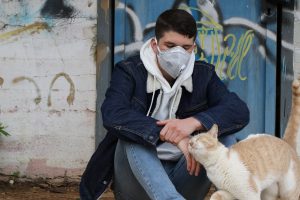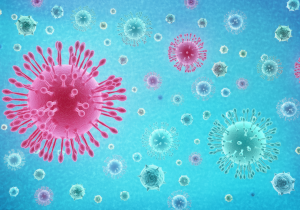COVID-19: Lessons from a Tumultuous Year.
As I glanced through the headlines in today’s paper (4 November), I was really struck, not for the first time, by the treasure trove that this period will be for future historians. I’ve been riveted by the debates, the diverse views, the reflections, even some of the terrifying possibilities of these days. Since Mary Kirrane sent me Fintan O’Toole’s article in March, I’ve reflected often on his compelling reminder that it should not take COVID-19 to remind us of the fragility of our lives. And I’ve realised that it’s more than COVID that’s calling us to the truth of this fragility.
 The vulnerability and precariousness of life has been intensified by the bizarre happenings in the U.S., and more immediately in our own country – by an inadequate budget, the sports and other rorts, and the legislation aimed at limiting the strength of democracy. The refusal of the Australian Government to support those most in need, such as asylum seekers (and the number of people needing help from the House of Welcome has gone from 150 to 500 in one week), the impacts of racism, the failure to deal with the climate crisis, or with housing and homelessness, aged care, education and health, have only exacerbated the already conflicted situation in which Australia finds itself. Additionally, we are now faced with a government plan to establish an anti-corruption body which is seen from the outset to be manifestly flawed. The coronavirus began with assertions that “we’re all in this together”, but it has been especially the generosity of non-Government bodies and individuals that has witnessed most clearly to the truth of this axiom.
The vulnerability and precariousness of life has been intensified by the bizarre happenings in the U.S., and more immediately in our own country – by an inadequate budget, the sports and other rorts, and the legislation aimed at limiting the strength of democracy. The refusal of the Australian Government to support those most in need, such as asylum seekers (and the number of people needing help from the House of Welcome has gone from 150 to 500 in one week), the impacts of racism, the failure to deal with the climate crisis, or with housing and homelessness, aged care, education and health, have only exacerbated the already conflicted situation in which Australia finds itself. Additionally, we are now faced with a government plan to establish an anti-corruption body which is seen from the outset to be manifestly flawed. The coronavirus began with assertions that “we’re all in this together”, but it has been especially the generosity of non-Government bodies and individuals that has witnessed most clearly to the truth of this axiom.
We continue to rejoice in the ways that so many Australians have acted with big-heartedness and generosity:
- the couple who donated to the Sydney Alliance the refunds from their failed overseas holiday to pay for three asylum seekers to be trained as community leaders
- the employers who retained staff, even though they had to pay wages from their own resources
- the religious community who donated their extra Government payments to asylum seeker charities
- the restaurants who prepared meals for international students and those made homeless
- the young people who helped prepare accommodation for homeless refugees, and the businesses who released employees to donate time to paint and clean
- the parishes, students and community members who gave time to deliver food and goods to families in need
- the fruit and veggie business which was closing down and donated all its remaining stock to the House of Welcome
- the community which has taken a deliberate decision to employ asylum seekers rather than use employment agencies.
As Mary MacKillop has reminded us, we have much for which to be grateful. And much also for which we need to remain vigilant. It was widely agreed in March that our country and our world would never be the same again. This seems to have been forgotten as leaders endeavour to return to past territorial skirmishes. Nonetheless, as so many political debates slide back into ‘much of the same’, we’ve also been gifted with insightful writings and interviews urging us to keep alert to all that COVID has exposed, and encouraging us, individually and as communities, to look again at all that might be possible.
 The fragility of life and the forced isolations of COVID call us again to prioritise society over the economy and remind us of the gift of going beyond our own needs, of the imperative of the gospel to see each person as sister and brother. The terrifying possibilities of political mayhem, and the temptations to corruption and soft autocratic government have tested our commitment to the strong social democracy to which Pope Francis is calling us in Fratelli Tutti. Laudato Si focussed on the interconnectedness of the whole of life. This encyclical speaks of the urgent imperative to reach out to each other in love. Francis invites us to move from ‘the dark clouds over a closed world’ to a vision of life as encounter, and to kindness as the star “shining in the midst of darkness”. Only in this way, he reminds us, will we free ourselves “from the cruelty, the anxiety, the frantic flurry of activity” that prevail in this otherwise chilling time”. Only in this way, he says, can we live hope.
The fragility of life and the forced isolations of COVID call us again to prioritise society over the economy and remind us of the gift of going beyond our own needs, of the imperative of the gospel to see each person as sister and brother. The terrifying possibilities of political mayhem, and the temptations to corruption and soft autocratic government have tested our commitment to the strong social democracy to which Pope Francis is calling us in Fratelli Tutti. Laudato Si focussed on the interconnectedness of the whole of life. This encyclical speaks of the urgent imperative to reach out to each other in love. Francis invites us to move from ‘the dark clouds over a closed world’ to a vision of life as encounter, and to kindness as the star “shining in the midst of darkness”. Only in this way, he reminds us, will we free ourselves “from the cruelty, the anxiety, the frantic flurry of activity” that prevail in this otherwise chilling time”. Only in this way, he says, can we live hope.
Not bad goals as we review, re-evaluate, and recommit in this extraordinary COVID era.
Jan Barnett rsj
Image: Coronavirus Teenager-Cat by Orna Wachman obtained from from Pixabay. Used with permission.
